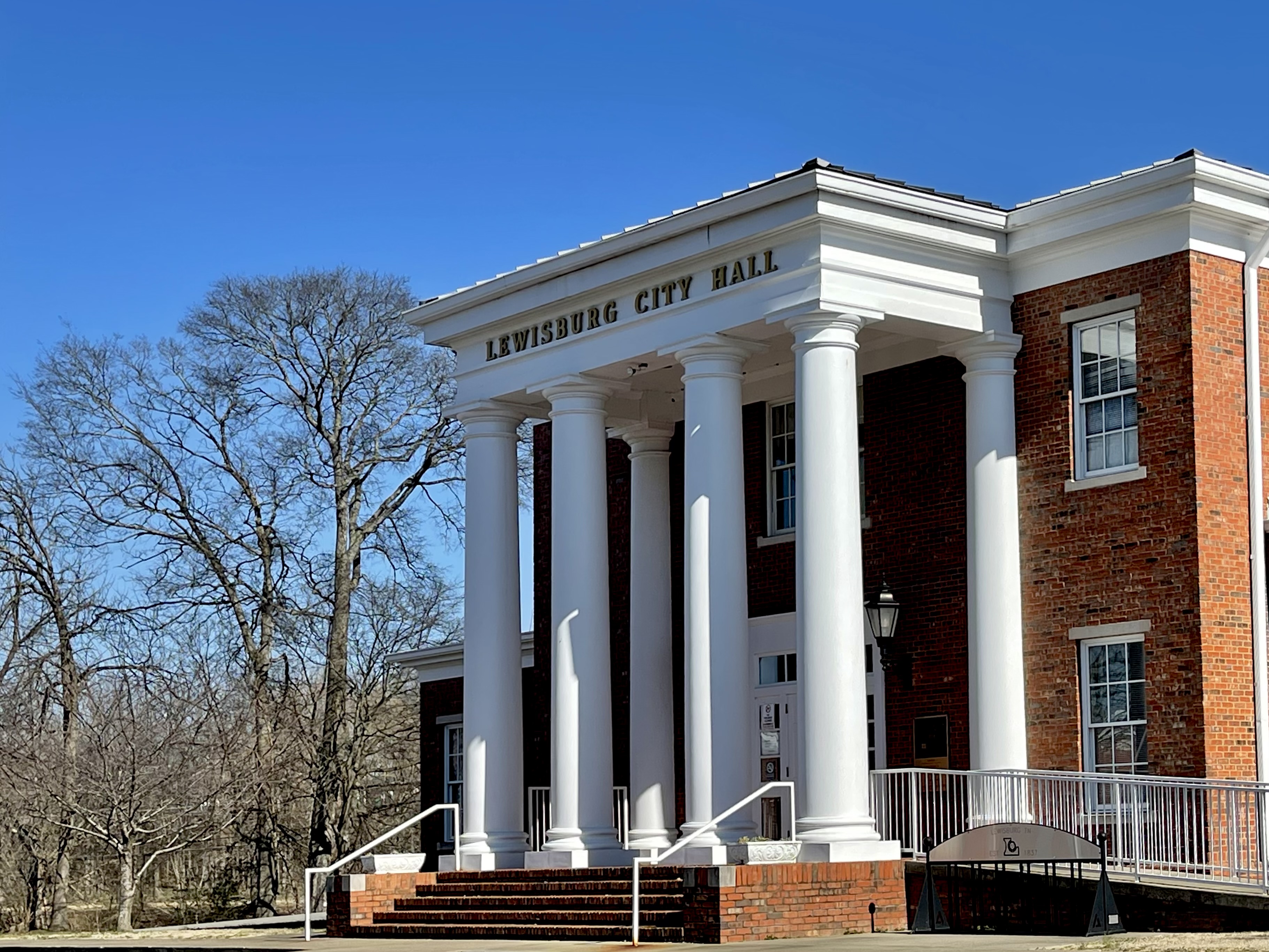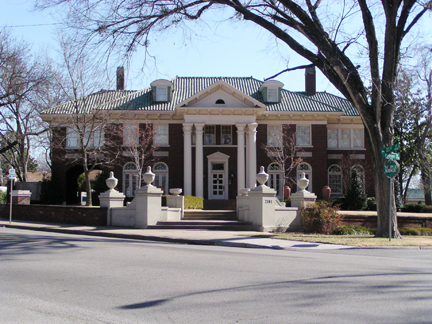|
J. M. Hall
James Monroe Hall (1851–1935) came to the town of Tulsa, Oklahoma, Tulsa in what was then known as Indian Territory. James and his brother, Harry C. Hall, operated a tent store that had followed the route of the Atlantic and Pacific Railroad and selected the site where the road would stop at Tulsa. They initially selected a site where the railroad crossed what would become Lewis Avenue and pitched a tent for the store there. This location was just inside the boundary of the Cherokee nation. When the Halls discovered that the Creek Nation had less restrictions on the activities of white merchants, they moved the store a couple of miles west to what would become First Street and erected a more permanent wooden building. Early life James Hall (often called J. M.) was born on a farm in Marshall County, Tennessee, near the town of Belfast, on December 4, 1851. He graduated from Union Academy in Marshall County, Tennessee when he was seventeen years old. Hall moved to Oswego, Kansas ... [...More Info...] [...Related Items...] OR: [Wikipedia] [Google] [Baidu] |
Marshall County, Tennessee
Marshall County is a county located in the U.S. state of Tennessee. As of the 2020 census, the population was 34,318. Its county seat is Lewisburg. Marshall County comprises the Lewisburg Micropolitan Statistical Area, which is also included in the Nashville-Davidson–Murfreesboro– Franklin, TN Metropolitan Statistical Area. It is in Middle Tennessee, one of the three Grand Divisions of the state. The Tennessee Walking Horse Breeders' and Exhibitors' Association is based here. In addition, the fainting goat is another animal breed developed here. To celebrate this unique breed, the county holds an annual festival known as "Goats, Music and More," drawing visitors from around the world. History Marshall County was created in 1836 from parts of Giles, Bedford, Lincoln and Maury counties. Marshall County was originally to be named Cannon County. Due to a clerical error at the time of formation in 1836 the names of Marshall and Cannon Counties, both formed in 1836, w ... [...More Info...] [...Related Items...] OR: [Wikipedia] [Google] [Baidu] |
First Presbyterian Church (Tulsa)
The First Presbyterian Church of Tulsa was organized in 1885 in Creek Nation, Indian Territory, before statehood. It originally met in the store owned by brothers James M. Hall and Harry C. Hall, and was served by itinerant, circuit-riding ministers. Its first building was wooden, built in 1899. The first permanent minister, Reverend Charles William Kerr and his wife arrived in Tulsa in 1900. Kerr served at this church for more than 40 years. Under his leadership, two more church buildings were constructed, each of stone. As Tulsa developed as a major city after the early 20th-century oil boom here, this church's congregation grew to become in 1948 the second-largest Presbyterian congregation in the country. FPC is part of the Eastern Oklahoma Presbytery of the United Presbyterian Church in the USA (UPCUSA). During the Tulsa Race Riot of 1921, Rev. Kerr offered church spaces as refuge to African Americans, mostly women and children fleeing the violence and widespread destruct ... [...More Info...] [...Related Items...] OR: [Wikipedia] [Google] [Baidu] |
Businesspeople From Tulsa, Oklahoma
A businessperson, businessman, or businesswoman is an individual who has founded, owns, or holds shares in (including as an angel investor) a private-sector company. A businessperson undertakes activities (commercial or industrial) for the purpose of generating cash flow, sales, and revenue by using a combination of human, financial, intellectual, and physical capital with a view to fueling economic development and growth. History Prehistoric period: Traders Since a "businessman" can mean anyone in industry or commerce, businesspeople have existed as long as industry and commerce have existed. "Commerce" can simply mean "trade", and trade has existed through all of recorded history. The first businesspeople in human history were traders or merchants. Medieval period: Rise of the merchant class Merchants emerged as a "class" in medieval Italy (compare, for example, the Vaishya, the traditional merchant caste in Indian society). Between 1300 and 1500, modern accoun ... [...More Info...] [...Related Items...] OR: [Wikipedia] [Google] [Baidu] |
People Of Indian Territory
A person ( : people) is a being that has certain capacities or attributes such as reason, morality, consciousness or self-consciousness, and being a part of a culturally established form of social relations such as kinship, ownership of property, or legal responsibility. The defining features of personhood and, consequently, what makes a person count as a person, differ widely among cultures and contexts. In addition to the question of personhood, of what makes a being count as a person to begin with, there are further questions about personal identity and self: both about what makes any particular person that particular person instead of another, and about what makes a person at one time the same person as they were or will be at another time despite any intervening changes. The plural form "people" is often used to refer to an entire nation or ethnic group (as in "a people"), and this was the original meaning of the word; it subsequently acquired its use as a plural form of pe ... [...More Info...] [...Related Items...] OR: [Wikipedia] [Google] [Baidu] |
1935 Deaths
Events January * January 7 – Italian premier Benito Mussolini and French Foreign Minister Pierre Laval conclude an agreement, in which each power agrees not to oppose the other's colonial claims. * January 12 – Amelia Earhart becomes the first person to successfully complete a solo flight from Hawaii to California, a distance of 2,408 miles. * January 13 – A plebiscite in the Territory of the Saar Basin shows that 90.3% of those voting wish to join Germany. * January 24 – The first canned beer is sold in Richmond, Virginia, United States, by Gottfried Krueger Brewing Company. February * February 6 – Parker Brothers begins selling the board game Monopoly in the United States. * February 13 – Richard Hauptmann is convicted and sentenced to death for the kidnapping and murder of Charles Lindbergh Jr. in the United States. * February 15 – The discovery and clinical development of Prontosil, the first broadly effective antibiotic, is published ... [...More Info...] [...Related Items...] OR: [Wikipedia] [Google] [Baidu] |
1851 Births
Events January–March * January 11 – Hong Xiuquan officially begins the Taiping Rebellion. * January 15 – Christian Female College, modern-day Columbia College, receives its charter from the Missouri General Assembly. * January 23 – The flip of a coin, subsequently named Portland Penny, determines whether a new city in the Oregon Territory is named after Boston, Massachusetts, or Portland, Maine, with Portland winning. * January 28 – Northwestern University is founded in Illinois. * February 1 – ''Brandtaucher'', the oldest surviving submersible craft, sinks during acceptance trials in the German port of Kiel, but the designer, Wilhelm Bauer, and the two crew escape successfully. * February 6 – Black Thursday in Australia: Bushfires sweep across the state of Victoria, burning about a quarter of its area. * February 12 – Edward Hargraves claims to have found gold in Australia. * February 15 – In Boston ... [...More Info...] [...Related Items...] OR: [Wikipedia] [Google] [Baidu] |
University Of Tulsa
The University of Tulsa (TU) is a private research university in Tulsa, Oklahoma. It has a historic affiliation with the Presbyterian Church and the campus architectural style is predominantly Collegiate Gothic. The school traces its origin to the Presbyterian School for Girls, which was established in 1882 in Muskogee, Oklahoma, then a town in Indian Territory, and which evolved into an institution of higher education named Henry Kendall College by 1894. The college moved to Tulsa, another town in the Creek Nation during 1904, before the state of Oklahoma was created. In 1920, Kendall College was renamed the University of Tulsa. The University of Tulsa is Carnegie Classification of Institutions of Higher Education, classified"> University of Tulsa. "History & Traditions." Undated. The ... [...More Info...] [...Related Items...] OR: [Wikipedia] [Google] [Baidu] |
Charles William Kerr
Charles William Kerr (2 April 1875 – 18 July 1951) was an American Presbyterian minister from Pennsylvania who served as pastor of First Presbyterian Church in Tulsa, Oklahoma from 1900 to 1941. Kerr was the first permanent Protestant Christian pastor to serve in Tulsa. He led the church through dramatic growth and change resulting from the discovery of oil in this area. Life and work Kerr was born April 2, 1875, to Mr. and Mrs. T. A. Kerr in Slippery Rock, Pennsylvania.Chronicles of Oklahoma, "Necrologies: Charles William Kerr", p. 510. igital.library.okstate.edu/Chronicles/v029/v029p510.pdf/ref> The Kerrs were a Scots Presbyterian Lowland family who had immigrated to western Pennsylvania in the late 19th century. Kerr graduated in 1893, with a Bachelor of Arts degree from Slippery Rock Normal Teachers College (now Slippery Rock University of Pennsylvania). He taught for two years in a school at Parkers Landing, Pennsylvania. In 1895, he began studying for the Presbyte ... [...More Info...] [...Related Items...] OR: [Wikipedia] [Google] [Baidu] |
Robert McGill Loughridge
Robert McGill Loughridge (December 24, 1809 – July 8, 1900) was an American Presbyterian missionary who served among the Creek in Indian Territory. He attended Miami University, Ohio, and graduated in 1837. Loughridge was ordained as a Presbyterian minister in October 1842. He entered Indian Territory in 1843, when he established the Koweta Mission in the Creek Nation. Seven years later, in 1850, he established the Tullahassee Mission, also in Creek territory. Like most missionaries, he left the territory during the American Civil War, and preached in Texas for eighteen years. He returned in 1881 at the request of the foreign mission board and the Creek. During his ministry, he became skilled in the Creek language. With help from Legus Perryman, he translated and transcribed portions of the Bible into Muskogee (Creek), along with hymns and catechisms, assisted by Ann Eliza Robertson. In 1890, Loughridge published an English-Muskogee dictionary with David M. Hodge; it w ... [...More Info...] [...Related Items...] OR: [Wikipedia] [Google] [Baidu] |
Tulsa, Oklahoma
Tulsa () is the second-largest city in the state of Oklahoma and 47th-most populous city in the United States. The population was 413,066 as of the 2020 census. It is the principal municipality of the Tulsa Metropolitan Area, a region with 1,023,988 residents. The city serves as the county seat of Tulsa County, the most densely populated county in Oklahoma, with urban development extending into Osage, Rogers, and Wagoner counties. Tulsa was settled between 1828 and 1836 by the Lochapoka Band of Creek Native American tribe and most of Tulsa is still part of the territory of the Muscogee (Creek) Nation. Historically, a robust energy sector fueled Tulsa's economy; however, today the city has diversified and leading sectors include finance, aviation, telecommunications and technology. Two institutions of higher education within the city have sports teams at the NCAA Division I level: Oral Roberts University and the University of Tulsa. As well, the University of Oklaho ... [...More Info...] [...Related Items...] OR: [Wikipedia] [Google] [Baidu] |
Arkansas River
The Arkansas River is a major tributary of the Mississippi River. It generally flows to the east and southeast as it traverses the U.S. states of Colorado, Kansas, Oklahoma, and Arkansas. The river's source basin lies in the western United States in Colorado, specifically the Arkansas River Valley. The headwaters derive from the snowpack in the Sawatch and Mosquito mountain ranges. It flows east into the Midwest via Kansas, and finally into the South through Oklahoma and Arkansas. At , it is the sixth-longest river in the United States, the second-longest tributary in the Mississippi–Missouri system, and the 45th longest river in the world. Its origin is in the Rocky Mountains in Lake County, Colorado, near Leadville. In 1859, placer gold discovered in the Leadville area brought thousands seeking to strike it rich, but the easily recovered placer gold was quickly exhausted. The Arkansas River's mouth is at Napoleon, Arkansas, and its drainage basin covers nearly .See ... [...More Info...] [...Related Items...] OR: [Wikipedia] [Google] [Baidu] |



_1938.jpg)



